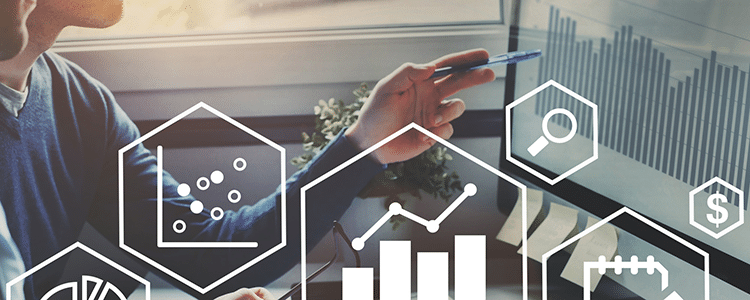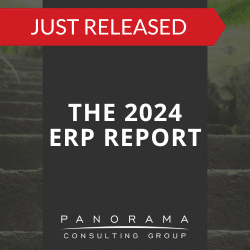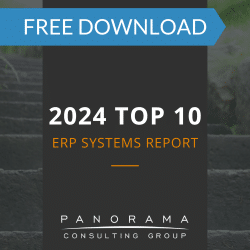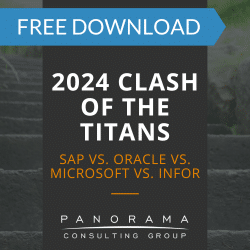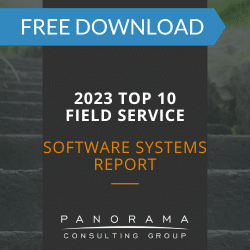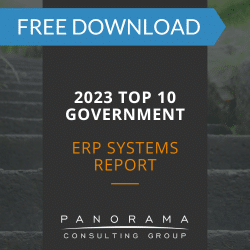What is the connection between business intelligence and ERP? In short, your ERP system is responsible for receiving and organizing data, while business intelligence (BI) tools analyze this data to provide actionable insights.
As you’re evaluating ERP systems, you’re likely paying close attention to reporting and business intelligence functionality. In this post, you’ll learn how to evaluate BI functionality and choose the right system (or systems) for your business needs.
What is Business Intelligence?
Business intelligence refers to technologies and practices that use data to drive change, minimize inefficiencies and take a more competitive stance in the midst of market shifts.
Modern BI software is built to make this process more effective. This software often provides data visualization as well as functionality powered by artificial intelligence (AI), such as predictive analytics and prescriptive analytics. Essentially, BI software analyzes operational and customer data to provide insights that enable you to make strategic business decisions.
2024 Clash of the Titans
SAP, Oracle, Microsoft, and Infor each have a variety of systems that can support data-driven decision making. We surveyed customers of these four vendors to find out what their selection and implementation process was like.
What is Enterprise Resource Planning?
Enterprise resource planning (ERP) software is designed to consolidate, centralize and automate critical departments, such as sales, customer service, human resources and accounting.
Before the rise of ERP software, departments essentially operated in silos, each using specialized software built for their specific needs. While this worked for a while, it made communication and collaboration a major challenge. Like a bad game of “Telephone,” it made it all too easy for data to become misconstrued as it traveled from source to source.
Today, ERP systems join all these functional areas together into an integrated system that operates out of a single, unified database. Now, users from all departments can have access to the same dataset and gain visibility into the company’s core operations.
What is the Connection Between Business Intelligence and ERP?
Now that we’ve covered the features of both BI and ERP software, you’re probably wondering how BI works together with ERP.
In many cases, BI functionality will already be built into your ERP system. Yet, that core functionality may not be robust enough for larger organizations that receive vast amounts of data every day.
If this describes your company, you may require advanced reporting features. In other words, you may need to implement a specialized BI tool and integrate it with your ERP system. (Learn more about the benefits of ERP integration.)
Regardless of whether your BI is native to your ERP or provided by an integrated third-party application, BI can help your company make the most of every piece of information it receives. Without it, the sheer volume of data that passes through your organization would be far too great to tackle en masse, let alone pick apart for actual insights.
The Limits of ERP Alone
While ERP systems can track the details of every operation and transaction, many ERP solutions do not have the capacity to translate this data into insights you can use, at least not quickly or easily.
Modern enterprises need a solution that will manage large volumes of data and turn it into insights that organizations can act on. This is where BI comes in. Business intelligence functionality can take all the data your ERP system captures, analyze it, and turn it into customizable, user-friendly reports.
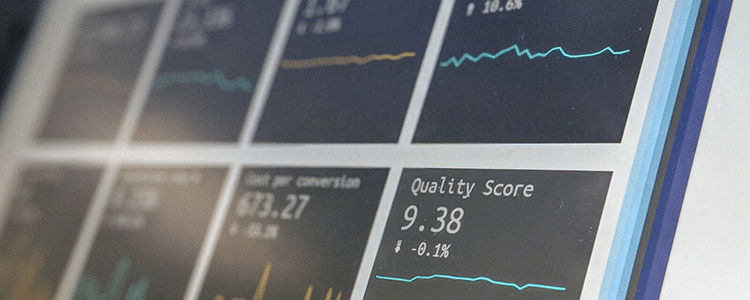
6 Benefits of BI in ERP
1. Accurate Predictions and Real-time Updates
Forget switching back and forth between multiple applications or shuffling through myriad spreadsheets. With BI, you can get a high-level view of your ERP data via dynamic dashboards that make it easy to understand the data you’re working with. From there, you can get as granular as you want, even tracing issues to their root causes.
2. More Accurate Reporting
When you automate your data analytics function, you do more than just save time. You also take human error out of the equation and make your reports more accurate and concise.
Further, you eliminate the risk of having various versions of the same report with no way to determine which one is correct. When you integrate BI into your ERP software, you can rest assured that everyone is working with the same data points and the same reporting tools.
3. Frees Up Internal Teams
Calculating business metrics and generating reports can easily be a full-time job. In fact, many enterprises have a team of experts dedicated only to data analysis.
With BI, anyone can generate sophisticated and accurate reports with the push of a button. The manual part of the effort is eliminated, which frees up internal support teams to attend to other mission-critical requirements.
The best part? Most BI applications are intuitive enough that anyone can use them without needing to learn complex coding languages. In fact, many applications have drag-and-drop features to help any user, at any level, create interactive, responsive reports.
4. Obtain Insights From Legacy Data
Modern BI tools can do more than process incoming data. They can also analyze historical data from your legacy systems, looking for insights that can help your business.
For instance, you may want to view your sales performance over the past five years to see if your numbers fluctuate during certain months. As long as this data has been migrated to your new ERP system, it will be easy for BI tools to access and analyze.
5. Predictive and Prescriptive Analytics
Business data is only valuable if it helps move your company forward. In addition to performing historical analyses, BI tools can use data to predict future trends. For instance, what are your projected year-end sales based on the numbers from the past six months?
In addition to predictive analytics, BI can also provide prescriptive analytics. This is where your system takes the predictions it has made and suggests actions for your business to take.
We recommend looking for an ERP system with IoT capabilities. This likely means the system has robust BI functionality. Many manufacturing firms are leveraging IoT in ERP to assist with shop floor challenges, such as preventative maintenance.
6. Make Smarter Use of Data
Even if you view data as one of your company’s most valuable assets, there’s a good chance you aren’t using it as well as you could be. With BI and ERP combined, you can finally leverage its full power and potential.
As a result, you’ll be able to improve core businesses processes as you learn more about what’s working and what isn’t. Other benefits you can expect include:
- More timely preventative maintenance
- Improved overall equipment effectiveness (OEE)
- More accurate demand forecasting
- Improved visibility, traceability and compliance
- Better understanding of your supply chain and production process
- Ability to identify areas to reduce waste or quicken cycle times
- Access to real-time updates on quality issues
- Ability to gauge performance across multiple locations in terms of product margins, turnover rates, etc.
ERP is Smarter With BI
There are countless possibilities at your fingertips, and it all starts with the raw data that your customers, partners and employees generate on a daily basis. Instead of letting those insights slip through the cracks, it’s best to invest in an ERP system with robust BI functionality or look for specialized BI tools to integrate with your ERP system.
What is the connection between business intelligence and ERP? When you combine the power of ERP with the power of BI, you’re equipped with data-rich intelligence that you can use to make faster, smarter decisions.
Our ERP consultants have found that improved data insights is one of the primary reasons organizations implement ERP. If this sounds like your company, it’s time to hire experienced resources who can help you find the right BI functionality based on your unique needs. Request a free consultation below to start discussing your needs.






